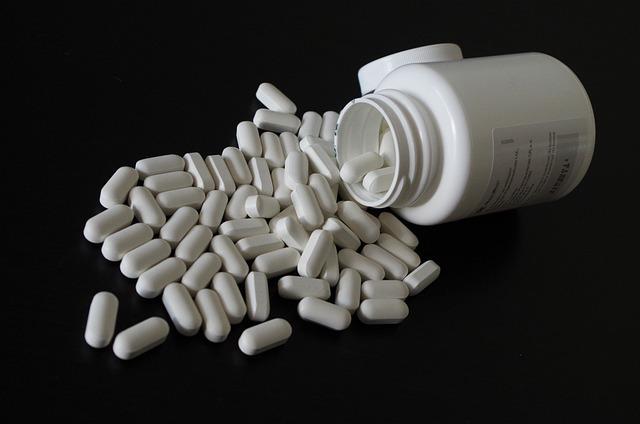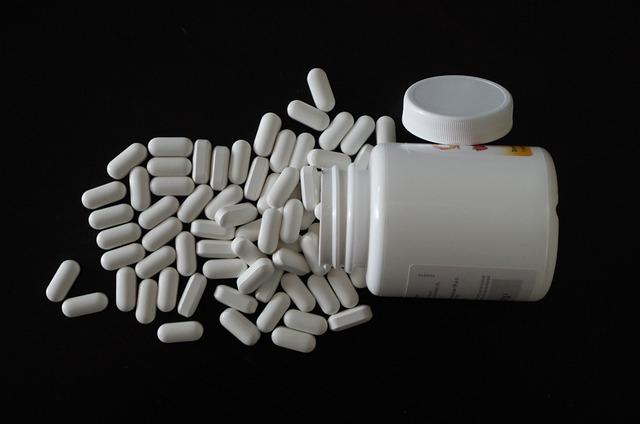Accidentally Took Multivitamin Before Colonoscopy? The Shocking Impact
Picture this: you’re moments away from undergoing a colonoscopy, that essential yet often dreaded procedure. You’ve meticulously followed the prep instructions—no greasy burgers, no late-night pizza—and suddenly, you pop a multivitamin like it’s a mint. Oops! What now? In this lighthearted yet informative article, we dive into the surprisingly shocking impact of that innocent little tablet. You’ll learn why your routine health habits might turn into a plot twist worthy of a sitcom. So, grab a snack (or not, we’re not judging), and get ready to uncover the hilarious, and perhaps a bit alarming, truth about what happens when your multivitamin and your colonoscopy plan collide!
Page Contents
- Understanding the Importance of Preparation for a Colonoscopy
- What Happens When You Mix Multivitamins with Colonoscopy Prep
- The Role of Vitamins in Digestive Health: What You Need to Know
- Potential Side Effects of Taking Multivitamins Before a Procedure
- Consulting Your Doctor: Why Communication is Key
- Alternatives to Multivitamins During Colonoscopy Prep
- How to Properly Prepare for Your Colonoscopy: Essential Tips
- The Bottom Line: Navigating Pre-Colonoscopy Guidelines
- Q&A
- Q&A: Accidentally Took Multivitamin Before Colonoscopy? The Shocking Impact
- Q1: What is a colonoscopy, and why is it important?
- Q2: What should I avoid before a colonoscopy?
- Q3: What happens if I accidentally take a multivitamin before my colonoscopy?
- Q4: Should I be worried if I took a multivitamin?
- Q5: What symptoms should I watch for after taking a multivitamin?
- Q6: Can I continue taking my multivitamins regularly after the colonoscopy?
- Q7: What are some tips to avoid this situation in the future?
- Q8: Where can I find more information about preparing for a colonoscopy?
- Future Outlook
- Metrogyl 400 for Tooth Pain: Say Goodbye to Dental Discomfort
- How to Get a Zofran Prescription: A Step-by-Step Guide
- Rivaroxaban Uses: Is It Right for You?
- Bentol Stomach Medicine: How It Helps and What to Expect
- What is the Shelf Life of Ivermectin? Important Facts for Safe Usage
- Does Rivaroxaban Affect APTT?
Understanding the Importance of Preparation for a Colonoscopy
Preparation for a colonoscopy is a critical step that ensures the procedure is effective and safe. The process of cleansing your colon is essential because it allows the doctor to clearly view the intestinal wall and detect any abnormalities. When you consume food or supplements, including multivitamins, shortly before the procedure, you can inadvertently complicate this process.
Here are several reasons why proper preparation is vital:
- Enhances Visibility: A clean colon provides a clearer view, which is crucial for identifying polyps, tumors, or other issues.
- Reduces the Risk of Errors: Ingestion of remnants from multivitamins may lead to false positives or missed findings during the examination.
- Minimizes Need for Repeat Procedures: Inadequate preparation could result in the need to reschedule the colonoscopy, thereby delaying diagnosis and treatment.
To assist in maintaining clarity during the examination, it is advisable to refrain from taking multivitamins or other supplements in the days leading up to your appointment. The following table summarizes key substances to avoid:
| Substance | Reason to Avoid |
|---|---|
| Multivitamins | Can leave residue in the colon |
| Iron Supplements | May discolor the bowel and affect imaging |
| Fiber Supplements | Can lead to incomplete cleansing |

What Happens When You Mix Multivitamins with Colonoscopy Prep
Mixing multivitamins with colonoscopy prep can lead to unexpected consequences that might not be on everyone’s radar. While multivitamins are often considered a safe addition to a daily routine, their interaction with the specific requirements of colonoscopy preparation can result in complications. The following points highlight what you need to be aware of:
- Absorption Issues: The presence of certain vitamins and minerals can interfere with the effectiveness of the prep solution, potentially leading to incomplete bowel cleansing.
- Gastrointestinal Disturbance: Some multivitamins may contain ingredients that can irritate the gastrointestinal tract, causing bloating or gas, which is counterproductive when you’re aiming for a clear digestive system.
- Altered Lab Results: The additional nutrients may skew blood results or other diagnostic markers, complicating your doctor’s evaluation post-procedure.
For a clearer understanding of the potential impact, here’s a quick reference table:
| Ingredient Type | Possible Interaction |
|---|---|
| Iron | Causes additional constipation, complicating bowel cleansing. |
| Magnesium | Might intensify diarrhea, impacting prep progress. |
| Vitamin C | Can lead to gastrointestinal discomfort, affecting the prep experience. |
Ultimately, it’s advisable to consult with your healthcare provider about your multivitamin intake leading up to a colonoscopy. By doing so, you can ensure that your preparation is as effective as possible and that you’re setting yourself up for a successful procedure.

The Role of Vitamins in Digestive Health: What You Need to Know
Vitamins play a crucial role in maintaining optimal digestive health, influencing everything from nutrient absorption to gut microbiome balance. Understanding the impact of specific vitamins can be particularly vital when preparing for medical procedures like a colonoscopy. Here’s how the most common vitamins can affect your digestive process, especially if taken inadvertently before such an examination:
- Vitamin C: A powerful antioxidant, excess vitamin C can lead to diarrhea or gastrointestinal upset, which is counterproductive when your digestive system needs to be clear.
- B Vitamins: B vitamins, especially B12, are essential for maintaining mucosal integrity. However, excessive intake can mask deficiencies or interfere with normal gut function.
- Vitamin D: Vital for calcium absorption and bone health, inappropriate amounts may alter gut flora, potentially complicating the procedure.
- Vitamin E: An important antioxidant, its blood-thinning properties can increase risks during procedures, affecting clotting and wound healing.
It’s essential to coordinate with your healthcare provider regarding which vitamins are safe to consume prior to your colonoscopy. Below is a brief overview of vitamins and their common effects relevant to digestive health:
| Vitamin | Common Effect on Digestion | Recommended Action |
|---|---|---|
| Vitamin C | Possible diarrhea | Avoid high doses |
| B Vitamins | Support gut health | Check specific needs |
| Vitamin D | Can alter gut flora | Consult before taking |
| Vitamin E | May affect clotting | Limit intake pre-procedure |
With adequate planning and knowledge of how these nutrients affect your health, you can mitigate any risks associated with accidentally consuming multivitamins before your colonoscopy. Always seek guidance from a medical professional to tailor your vitamin intake, ensuring both digestive health and procedural safety.

Potential Side Effects of Taking Multivitamins Before a Procedure
Taking multivitamins in the days leading up to a colonoscopy might seem harmless, but it can lead to unexpected complications that could impact the procedure’s outcome. While these vitamins are often viewed as health boosters, their ingredients can interact with the preparations necessary for a successful colonoscopy. Some potential side effects include:
- Increased Blood Thinning: Certain vitamins, particularly Vitamin E and Fish Oil, can act as blood thinners, increasing the risk of bleeding during the procedure.
- Altered Absorption: The presence of additional nutrients might interfere with the absorption of the bowel prep solution, potentially leading to an incomplete cleanse.
- Stomach Upset: Multivitamins can sometimes cause gastrointestinal discomfort, which can exacerbate discomfort during the colonoscopy prep phase.
Moreover, it’s essential to consider how specific ingredients can affect the body’s response:
| Ingredient | Potential Impact |
|---|---|
| Vitamin K | May interfere with anticoagulant medications if present in high doses. |
| Iron | Can lead to intestinal irritation and constipation, impacting colon health. |
| Calcium | Excessive calcium can affect stool consistency, complicating bowel prep. |
When preparing for a colonoscopy, it’s advisable to consult your healthcare provider about all consumables, including multivitamins, to avoid these side effects and ensure a smooth procedure.

Consulting Your Doctor: Why Communication is Key
When it comes to preparing for a colonoscopy, effective communication with your healthcare provider is not just beneficial—it’s essential. Many individuals underestimate the importance of sharing every detail of their pre-procedure regimen, including any vitamins or supplements taken. This is particularly critical if you’ve accidentally taken a multivitamin before your procedure, as it could lead to significant complications or skewed results.
Clear communication can help your doctor determine:
- Potential Interactions: Certain vitamins and minerals can interact with medications or alter the results of the procedure, leading to inaccurate assessments.
- Preparation Adjustments: Your physician may suggest specific adjustments to your preparation plan to ensure a safe and effective colonoscopy.
- Post-Procedure Precautions: If the multivitamin contains iron or other components, your doctor may advise on potential side effects to monitor after the procedure.
By being open about every aspect of your health regimen, you empower your doctor to provide the best care possible. Remember that no detail is too small when it comes to your health. Here’s a simple comparison to highlight common multivitamin ingredients that may cause concerns:
| Ingredient | Potential Impact |
|---|---|
| Iron | Could lead to gastrointestinal issues or complicate recovery. |
| Vitamin K | May interfere with anticoagulant medications. |
| B Vitamins | High doses may alter lab results related to the procedure. |
Ensuring your doctor is fully informed can mitigate risks and enhance the accuracy of your colonoscopy results. As you prepare for your procedure, take time to review your supplement intake and discuss it thoroughly with your healthcare provider.

Alternatives to Multivitamins During Colonoscopy Prep
If you’ve mistakenly taken a multivitamin before your colonoscopy, you might be wondering about alternatives that can help maintain your nutrient levels without compromising your prep. Just because you’re stepping back from multivitamins doesn’t mean you have to forgo essential nutrients altogether. Here are some **ideas to consider**:
- Whole Foods: Incorporate easily digestible foods rich in essential vitamins and minerals, such as:
- Bananas
- Applesauce
- White rice
- Plain yogurt
- Clear Broths: Consuming clear broths can provide hydration and electrolytes. Consider chicken or vegetable broth as soothing alternatives.
- Electrolyte Solutions: Oral rehydration solutions can help replace lost electrolytes and are much gentler on the digestive system.
Here’s a quick comparison of traditional multivitamin alternatives:
| Alternative | Nutritional Benefit |
|---|---|
| Whole Foods | Rich in targeted nutrients & fiber |
| Clear Broths | Hydration & electrolytes |
| Electrolyte Solutions | Fast rehydration, especially post-prep |
Choosing these alternatives can support your body’s nutritional needs while ensuring a productive and safe colonoscopy prep. Remember to consult with your healthcare provider for personalized advice, especially if you’re unsure about specific dietary restrictions prior to your procedure.
How to Properly Prepare for Your Colonoscopy: Essential Tips
Preparing for a colonoscopy involves several crucial steps to ensure accurate results and a smooth procedure. One essential tip is to follow dietary restrictions leading up to the exam. Typically, your doctor will recommend avoiding fiber-rich foods for a few days before the procedure and switching to a low-fiber diet. Additionally, two days prior to the colonoscopy, it’s important to switch to a clear liquid diet to keep your colon clean.
Another critical factor is the timing of your bowel prep. Many preparatory solutions need to be taken the night before the exam or even the morning of the procedure, depending on your scheduling. Here are some quick tips:
- Stay hydrated: Drink plenty of clear fluids to help flush your system.
- Stick to the schedule: Administer bowel prep solution as directed—don’t skip doses.
- Be mindful of your medications: Inform your doctor about all medications you are taking, including supplements.
Though a multivitamin might seem harmless, it may contain ingredients that can affect the clarity of your colonoscopy results. If you accidentally take a multivitamin before your prep, remember:
- Continue to hydrate: Drink additional clear fluids to help flush out your system.
- Notify your healthcare provider: They can advise you on whether to proceed as planned or reschedule.
When preparing for a colonoscopy, adhering to pre-procedure guidelines is crucial for ensuring clear results and minimizing complications. The recommended **dietary restrictions** and **medication guidelines** are specifically designed to clear the intestines and provide the best visualization for the physician. However, inadvertently taking a multivitamin can introduce substances that may affect these outcomes. Here are some factors to consider:
- Coloring Agents: Many multivitamins contain artificial dyes, which can alter the color of stool and potentially interfere with the examination.
- Iron Supplements: If your multivitamin has iron, it can cause the stool to appear dark, complicating the interpretation of results.
- Folic Acid: High doses of folic acid may lead to misinterpretation of certain blood test results associated with colon health.
Ultimately, the impact of a multivitamin taken before a colonoscopy largely depends on the timing and specific ingredients. To navigate this landscape effectively, consider adopting a meticulous approach to preparation:
| Best Practices | Considerations |
|---|---|
| Review medication and supplement guidelines | Consult your physician for any concerns regarding vitamins |
| Stick to a clear liquid diet before the procedure | Avoid solid foods and certain colored liquids |
| Inform the medical team of all supplements taken | Transparency can lead to better handling of potential complications |
Always prioritize clear communication with your healthcare provider. Understanding the implications of your dietary and supplement choices can significantly influence the results of your colonoscopy and your overall health journey.
Q&A
Q&A: Accidentally Took Multivitamin Before Colonoscopy? The Shocking Impact
Q1: What is a colonoscopy, and why is it important?
A1: A colonoscopy is a medical procedure used to examine the inner lining of the large intestine (colon) and rectum. It’s important because it helps detect any abnormalities, such as polyps or cancer. Regular screenings can catch potential issues early, making them easier to treat.
Q2: What should I avoid before a colonoscopy?
A2: Before a colonoscopy, it’s crucial to follow your doctor’s pre-procedure instructions, which usually include avoiding certain foods and drinks. Typically, you need to stop taking vitamins, supplements, and medications that can interfere with the procedure. This helps ensure a clear view of the colon during the examination.
Q3: What happens if I accidentally take a multivitamin before my colonoscopy?
A3: If you accidentally take a multivitamin just before your colonoscopy, it can potentially affect the results. Some vitamins, particularly iron and certain B vitamins, can cause discoloration in the colon or interfere with the cleaning process, making it harder for the doctor to see what’s going on.
Q4: Should I be worried if I took a multivitamin?
A4: While it might not be a complete disaster if you took a multivitamin accidentally, it’s best to inform your healthcare provider. They can assess the situation based on which specific multivitamin you took and how close it was to the procedure time. They might suggest continuing with the procedure or rescheduling it.
Q5: What symptoms should I watch for after taking a multivitamin?
A5: Typically, if you took a single multivitamin and you’re otherwise healthy, you might not experience any symptoms. However, if you notice unusual changes, such as gastrointestinal discomfort, excessive bloating, or changes in bowel habits, it’s wise to consult your doctor.
Q6: Can I continue taking my multivitamins regularly after the colonoscopy?
A6: Yes, in most cases, you can continue taking your multivitamins after your colonoscopy. Just make sure to follow any guidelines your doctor provides regarding when to resume taking medications or supplements post-procedure.
Q7: What are some tips to avoid this situation in the future?
A7: To avoid taking multivitamins before a colonoscopy, it’s a good practice to set reminders for yourself about pre-procedure instructions. You might also consider keeping your vitamins and medications stored separately from your regular medicines for a few days leading up to the procedure.
Q8: Where can I find more information about preparing for a colonoscopy?
A8: You can find more information on the preparation for a colonoscopy on reputable medical websites, such as the American Society of Gastrointestinal Endoscopy or the Mayo Clinic. Your healthcare provider can also give you tailored advice based on your health history and the procedure in question.
Remember, it’s always best to communicate openly with your healthcare provider about any concerns you have, especially regarding procedures like colonoscopies!
Future Outlook
while the prospect of inadvertently taking a multivitamin before a colonoscopy may seem trivial, its potential effects on your procedure are far from negligible. Understanding the implications helps you prioritize safety and preparation—key elements for a successful outcome. Remember, always communicate with your healthcare provider about any supplements or medications you take, even if they seem harmless. By being informed and proactive, you can ensure the best possible experience and results. So, the next time you prep for a colonoscopy, double-check that your regimen is clear—your health is worth it!


